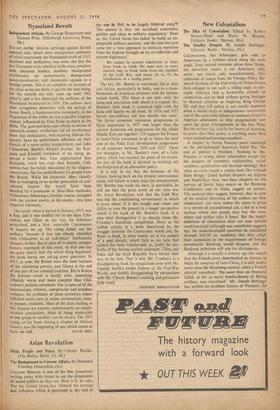Asian Revolution
Ideas, People and Peace. By, Chester Bowles. (The Bodlcy Head, 12s. 6d.)
The Background to Current Affairs. By Desmond Crowley, (Macmillan, 21s.) CHESTER BOWLES is one of the few Americans writing today with vision to see the dimensions of world politics as they are. How is it, he asks, that the United States has 'allowed the prestige and influence which it possessed at the end of the war In 1945 to be largely frittered away'? The answer is that 'we sacrificed economics, politics and ideas to military expediency.' Even so, the United States has failed `to build an im- pregnable military position,' and the time has now come for a 'new approach to extricate ourselves from the impasse brought on by an inflexible and narrow diplomacy.'
We cannot be content indefinitely to teeter
from brink to brink. We must seek in every realistic way to break loose from the rigidities of the Cold War, and create bit by bit the foundations of a lasting peace.
The key, Mr. Bowles is convinced, lies in Asia and Africa, particularly in India, and in a trans- formation of American relations with the uncom- mitted world. This thesis is not new, only the force and conviction with which it is argued. Mr. Bowles's little book is crammed tight with the facts and figures we all want. In 1956 and 1957 Soviet non-military aid was double our own'; 'the Soviet economic assistance programme to Syria negotiated in 1957 was larger than the current American aid programme for the whole Middle East put together'; US support for France in Indo-China amounted in all to 'twice the total cost of the Point Four development programme in all countries between 1950 and 1957.' These are examples, in Mr. Bowles's view, of a false policy which has reached the point of no return; the rest of his book is devoted to working out the blueprints of an alternative policy.
It is safe to say that the historian of the future, looking back on the present international scene, will follow in many ways the interpretation Mr. Bowles has made his own; in particular, he will see that the great event of our time was the Asian Revolution, and that the Cold War was but the conditioning environment in which it came about. It is this insight and vision and ability to view the present in a longer perspective which is the mark of Mr. Bowles's book. It is also what distinguishes it so sharply from Mr. Crowley's humdrum compilation. Here, as the author admits, is a book dominated by the struggle between the Communist world and the West—a book, In other words, set in the pattern of a past decade, which fails to see how that pattern has been transformed, as, under the um- brella of the thermo-nuclear stalemate, China and India and the Arab Republic have forced their way to the fore. That is why Mr. Crowley's is a disappointing book by comparison even with Mr. Connell Smith's recent Pattern of the Post-War World, and doubly disappointing by comparison with Mr. Chester Bowles's exciting and persuasive little tract:
GEOFFREY BARRACLOUGH






























 Previous page
Previous page